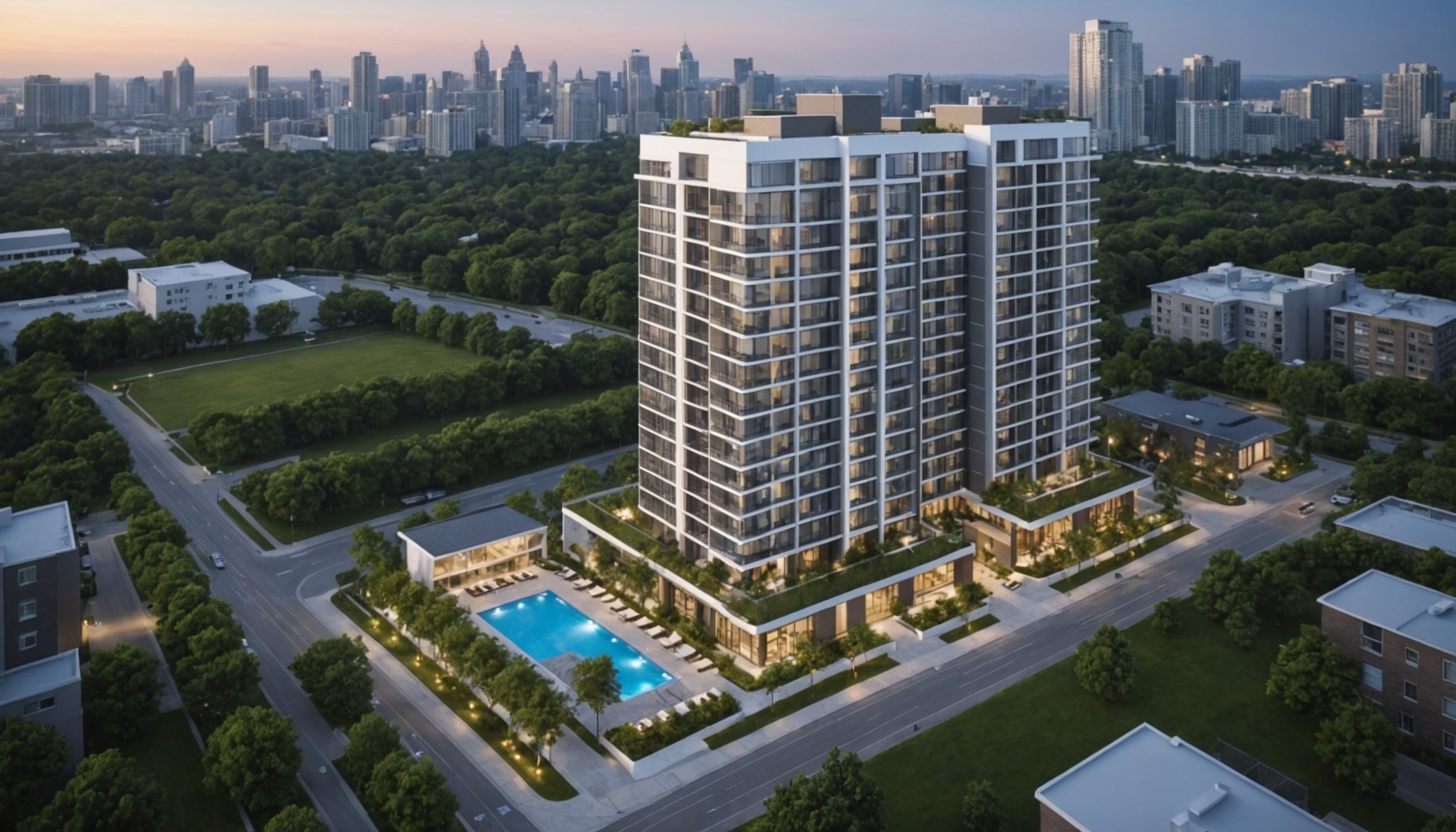Digital Marketing Techniques
Effective digital marketing is critical to drive the success of new condominium projects. One of the key tactics is targeted online advertising, which allows developers to reach potential buyers with precision. By analyzing demographics and buyer behavior, campaigns can be tailored to engage the most relevant audience segments.
Beyond advertising, implementing strong SEO strategies is vital. Good SEO ensures that potential buyers easily find information about developments through search engines. By optimizing website content with relevant keywords and technical enhancements, visibility on platforms like Google can be significantly improved, attracting organic traffic.
Also to see : Transforming Real Estate into a Catalyst for Community Health: Cutting-Edge Approaches for Vibrant Neighborhoods
Creating engaging content is another essential strategy. This includes blog posts, videos, and infographics that educate and captivate potential buyers, guiding them through their purchasing journey. Content should not only inform but also reflect the unique value propositions of the condominium, creating a memorable digital touchpoint.
In summary, blending online advertising, strategic SEO, and engaging content creation forms the foundation of a successful digital marketing approach. These tactics, when employed effectively, ensure high visibility, attract interested parties, and ultimately drive condominium sales. By focusing on these techniques, marketers can achieve optimal results and support the overall success of real estate projects.
Also to discover : Unlocking sustainable real estate financing in the uk: the role of green bonds
Social Media Campaigns
To tap into potential buyer interests, social media marketing effectively leverages the allure of platforms like Instagram and Facebook. These platforms are ideal for visual storytelling, providing developers with dynamic means to showcase condominium features and lifestyles through captivating imagery and compelling narratives. Influencer partnerships further amplify reach, as influencers bring credibility and broaden the audience base. By collaborating with influencers whose aesthetics and values align with the condo being marketed, developers can harness authentic engagement and build trust with potential buyers.
Crafting tailored campaigns to resonate with specific target audiences is another critical element. These campaigns should be designed to reflect the aspirations and daily life experiences of the desired demographic, emphasizing how the condominium aligns with their lifestyle and needs. Engaging content is crucial—think interactive posts or live virtual tours that invite viewers into the lifestyle the development offers. By systematically building a brand presence on social media, developers can create a robust digital footprint that not only promotes but connects.
Ultimately, social media platforms offer a versatile and expansive space where visuals, community interaction, and strategic partnerships converge to form effective brand promotion and capture buyer interest.
Virtual Tours
The integration of virtual reality in property showcasing has revolutionized how buyers explore new condominiums. Virtual tours offer immersive experiences that allow potential buyers to navigate through properties from the comfort of their homes. This technology is pivotal for enhancing the buyer’s journey, offering them a real-life feel of the space without physical boundaries.
High-quality immersive experiences provide detailed visuals and interaction, thereby increasing engagement and interest. Virtual reality tours can highlight architectural features and amenities, presenting a near-real perspective to viewers who might otherwise not visit in person. The accessibility and convenience of virtual tours broaden the reach of marketing initiatives, capturing a diverse audience.
Utilizing advanced technology to produce high-resolution, interactive visuals enables potential buyers to connect emotionally with the property. When executed effectively, these visuals foster a compelling narrative that resonates with buyers, helping them envision their future lifestyle within the space. As a result, the likelihood of advancing into more serious inquiries or transactions increases, making virtual tours an essential component of modern digital marketing strategies in real estate. By prioritizing these technological advancements, developers can maintain competitive advantage by offering a comprehensive and satisfying experience.
Collaborations with Real Estate Agents
Forming real estate partnerships can significantly enhance the outreach for new condominium projects. By tapping into extensive agent networks, developers can increase their pool of potential buyers swiftly and effectively. Local agents bring valuable insights into market trends and buyer preferences, translating to more tailored and successful marketing efforts.
Developers should consider establishing referral programs that incentivize agents to actively promote their developments. These programs not only encourage agents to prioritize your listings but also foster long-term collaboration. Incentives can range from commission bonuses to exclusive perks for agents who successfully close deals on your behalf.
When you leverage an agent’s existing connections with potential buyers, your development gains credibility and trust. This is crucial in attracting serious inquiries and interest. Furthermore, by collaborating with agents who are familiar with local nuances, developers can craft strategies that speak directly to the target demographic, capitalizing on cultural or regional preferences.
Referral programs and real estate partnerships collectively amplify marketing messages, ensuring wider dissemination and resonance. The collaborative approach focuses on mutual benefits, optimizing not only outreach but also resource utilization across all parties involved.
Community Engagement
Fostering a sense of community is essential in community marketing strategies for condominium projects. Building strong relationships with local businesses and organisations can enhance local outreach. By collaborating on events and initiatives, developers can create a network of connections that amplify their marketing efforts.
Hosting community events provides a tangible platform to showcase condominium developments. Such events facilitate potential buyers in experiencing the lifestyle and atmosphere firsthand. This level of engagement encourages residents and potential buyers alike to feel more connected to the development. It also presents opportunities for direct interaction, fostering positive relationships and trust.
Encouraging resident involvement is another key aspect. By promoting active participation in community activities, developers can foster a sense of belonging. This approach not only benefits current residents but also appeals to prospective buyers who value community living. Providing platforms for residents to share their experiences and stories can serve as authentic endorsements, further driving interest.
Overall, community engagement is more than just marketing; it is about creating lasting connections and a shared sense of purpose. By leveraging local outreach and participation in events, developers can strengthen brand presence and enhance the appeal of condominium projects.
Measuring Effectiveness of Strategies
In digital marketing, establishing clear metrics is essential for measuring success. Marketing analytics helps track the performance of strategies, ensuring their alignment with objectives. By setting precise goals, such as increasing web traffic or improving engagement rates, developers can gauge marketing effectiveness.
Performance metrics, like conversion rates and click-through rates, offer insights into the success of strategies. These metrics provide a snapshot of audience interactions, indicating which tactics are resonating. Moreover, they help identify areas needing adjustments, ensuring campaigns are consistently optimized for better results.
To optimize strategies, utilizing advanced analytics tools is pivotal. These tools enable developers to assess data in real-time, offering a nuanced understanding of strategy performance. This analysis is vital for comparing different approaches and determining their return on investment.
By iterating strategies based on data insights, developers can refine their marketing efforts. Feedback loops allow continuous improvement, ensuring campaigns remain relevant and effective.
Incorporating a strategy optimization approach transforms data into actionable strategies, maximizing marketing impact. By focusing on analytics and performance metrics, marketers can make informed decisions, enhancing visibility and driving condominium sales.
Leveraging Local Events
Engaging local events is instrumental for increasing brand visibility of new condominium projects. Participating in local fairs and networking occasions not only boosts recognition but creates direct avenues for interaction with potential buyers. It offers developers a fantastic chance to display their properties in a real-world context, pulling in those who may have a keen interest in upscale real estate.
By sponsoring community events, developers can further solidify their presence. Such sponsorships naturally increase brand visibility, associating the condominium with positive community involvement and supporting trust within the local populace. This affiliation may encourage attendees to consider purchasing a condo as it aligns with their values.
Networking opportunities present themselves throughout these local events, allowing developers to forge strategic connections with other industry professionals, potential buyers, and partners. Establishing a significant presence in these activities can catalyse opportunities for future collaborations and cross-promotions, further expanding the condominium’s reach.
By strategically participating in local activities and events, developers can significantly enhance brand visibility and engagement. This fosters a deep-rooted connection with the community, making the new condominium projects a potential powerhouse in decision-making processes for prospective buyers. The approach couldn’t be more adaptable yet impactful in the dynamic world of real estate marketing.
Digital Marketing Techniques
In the realm of digital marketing for condominium projects, targeted online advertising emerges as a powerful tool. Developers can pinpoint potential buyers with precision by analysing demographics and behaviours, ensuring the advertising message reaches the right audience. This approach maximizes the impact of marketing budgets by focusing on those most likely to engage.
Beyond advertising, SEO strategies play a pivotal role in enhancing a project’s visibility on search engines. By integrating relevant keywords into website content and employing technical improvements, developers can significantly boost their ranking on search platforms. This not only makes it easier for interested buyers to find the project online but also increases the credibility of the development through organic traffic.
Equally important is creating engaging content that draws in and educates potential buyers. This can take the form of blog posts, informative videos, or visually appealing infographics. Content should highlight the unique selling points of the condominium, effectively communicating its value proposition. By providing informative and captivating material, developers can ensure that potential buyers remain engaged and informed throughout their decision-making journey, leading to higher conversion rates.









